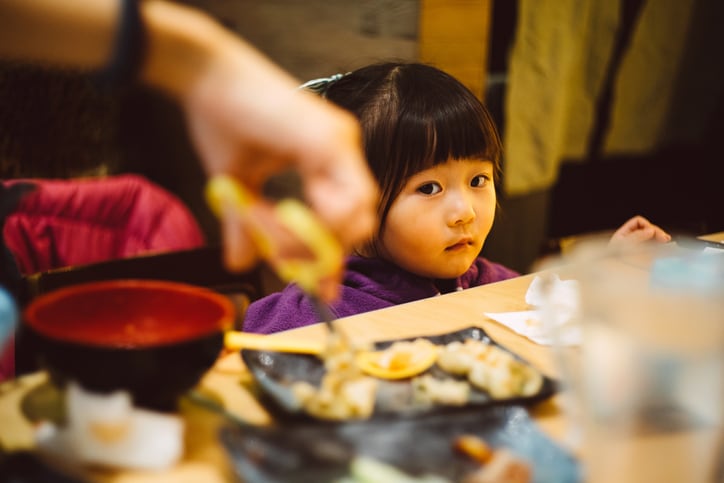A 2-year-old sees a candy display at the grocery store checkout. He wants a chocolate bar, and his caregiver says no. A meltdown ensues. A few minutes later, an 8-year-old wants the same candy bar and is told no; however, he protests for a few seconds and then moves on. The difference between the two children, besides a few years and a couple of inches? The older child has developed the ability to self-regulate. Sometimes he still gets upset, but he’s able to control it so it doesn’t become a full-blown, on-the-floor meltdown.
So how exactly does a child develop self-regulation skills? Is it just a matter of them getting older and maturing — or do they need to learn and practice specific skills? Experts weigh in to help parents and caretakers understand emotional self-regulation in children and why it’s important, as well as provide some useful self-regulation strategies for kids.
What is self-regulation for kids?
Here’s how experts helped us break down self-regulation. According to Kendra Read, clinical psychologist and vice president of therapy at Brightline, self-regulation is the ability to be aware of, and then manage one’s emotions within the context of a situation.
Self-regulation is the ability to be aware of, and then manage one’s emotions within the context of a situation.
— KENDRA READ, CLINICAL PSYCHOLOGIST
We are not simply born with the ability to self-regulate, but we ideally develop these skills during childhood by learning to tolerate uncomfortable feelings and, over time, control sudden outbursts of emotion.
“Self-regulation lets humans handle strong emotions such as rage, righteousness, panic, stress and grief in healthy ways that protect their physical and mental health and allow them to continue successfully functioning in their daily lives,” says Robyn Rausch, licensed professional counseling supervisor and play therapist who specializes in helping children with dysregulation disorders such as ADHD.
Why is self-regulation important in early childhood?
We can’t expect young children to completely master the skills of self-regulation, says Read. However, self-regulation is crucial for children to work on and learn as they get older because it helps them navigate their “big emotions” and decreases the frequency of emotional dysregulation behaviors like temper tantrums. Additionally, Read explains, “With children, this is their ability to navigate how to handle, or not handle, a situation depending on their needs or goals.”
For young children, self-regulation involves developing patience, focusing and acting in socially appropriate manners, says Michael Vance, psychologist and director of behavioral health at Children’s Hospital & Medical Center in Omaha, Nebraska.
Why is self-regulation important in school-age children?
Self-regulation is a skill that children need to develop as they begin to navigate the larger world around them and becomes even more important as they enter school. “These skills are important,” Vance explains, “because they can impact a child’s school performance, social relationships, athletic and artistic performances and autonomy.”
In fact, a 2022 study published in Nature Human Behavior found that teaching elementary school-aged kids “soft skills” like self-regulation not only improved behavior and academic performance but increased their long-term academic success.
When kids can’t self-regulate as conflicts arise at school, they succumb to feelings like stress and anger, says Rausch. Some children may be able to squeak by, but lacking emotional self-regulation skills, she explains, can cause issues like academic challenges or getting sent home from school often. Down the road, underdeveloped self-regulation skills can result in an inability to stay in a job for very long, substance use issues and problems in personal relationships, Rausch adds.
“These skills are important because they can impact a child’s school performance, social relationships, athletic and artistic performances and autonomy.”
— michael vance, psychologist
At what age can children self-regulate?
Self-regulation skills develop over time, Vance explains. There will be stops and starts, but emotional self-regulation is something you’ll see blossoming even in early childhood, such as a baby who self-soothes by sucking on their thumb or a toddler who learns to wait a minute for their snack, Vance describes. However, the timeline for how self-regulation develops will vary from one child to another, Vance says, and may even vary within the same child, depending on the context.
According to Rausch, most children don’t fully develop their self-regulation skills until they enter their teen years. That’s because self-regulation requires something called “meta-thinking,” which means being able to recognize what’s happening in the body and brain and then knowing what we need to do to stay emotionally stable. Meta-thinking doesn’t fully develop until puberty, when hormones trigger the development of fiber tracts between the emotion/memory part of the brain (limbic system) and thinking/choosing parts of the brain (frontal lobe), Rauch explains.
What are some self-regulation strategies for kids?
When it comes to self-regulation strategies for kids, research from the U.S. Department of Health & Human Services shows that both parents and caretakers have important roles to play. A review of almost 50 studies found that parental warmth and responsiveness can promote better self-regulation skills in kids. Moreover, child caretakers, teachers and extended family who spend significant amounts of time with children have vital roles in supporting self-regulation skills.
According to the study, these are the three broad categories of support caregivers can provide to help children develop self-regulating skills:
- Forming a loving, respectful and securely attached relationship with the child, which helps them feel confident as they explore the world.
- Creating a structure for their lives that reduces environmental stresses and is organized around predictable routines and expectations.
- Imparting self-regulation skills through modeling, teaching and positive reinforcement.
What activities help children to self-regulate?
According to Read, “emotional coaching” is the most important strategy for helping kids develop these important skills. “This can consist of naming emotions,” she says. “We can help kids ‘name it to tame it’ to better identify what they are feeling in a situation and build a shared language about what is happening for them.”
But helping kids name their “big feelings” doesn’t mean that we are encouraging the feelings to disappear, Read says. “Instead, focus on mindfulness, which includes awareness without judgment of the feeling,” she advises. “Emotions often come in waves, and parents can instead focus on ‘riding the wave’ or the emotion while practicing making other behavioral choices in the situation such as facing a fear, keeping a safe body or using an indoor voice.”
“Emotions often come in waves, and parents can instead focus on ‘riding the wave’ or the emotion while practicing making other behavioral choices in the situation such as facing a fear, keeping a safe body or using an indoor voice.”
— KENDRA READ, CLINICAL PSYCHOLOGIST
Looking for some activities to help kids develop their self-regulation skills? Rausch suggests the following:
- Spending time in nature.
- Limiting screen time.
- Playful engagement with caretakers, such as bedtime stories and tickle fights.
- Sensory-stimulating play (i.e., letting kids make a mess!).
- Modeling your own self-regulation skills, such as verbalizing your feelings and coping skills as you navigate through frustrating moments in life.
What does it mean if a child is having trouble self-regulating?
Most kids develop self-regulation skills in due time, as part of normal development. “Every child is different, and parents shouldn’t worry that something is wrong every time their child experiences a moment of emotional dysregulation,” Read assures. “In fact, a good portion of this is typical as youth grow and develop.”
That said, sometimes kids do need a little help developing these skills. If your child is having frequent and intense moments of dysregulation, such as frequent meltdowns, and these are interfering with everyday life, it might be time to seek expert help, says Read. She suggests reaching out to your child’s pediatrician or a mental health expert for support.






